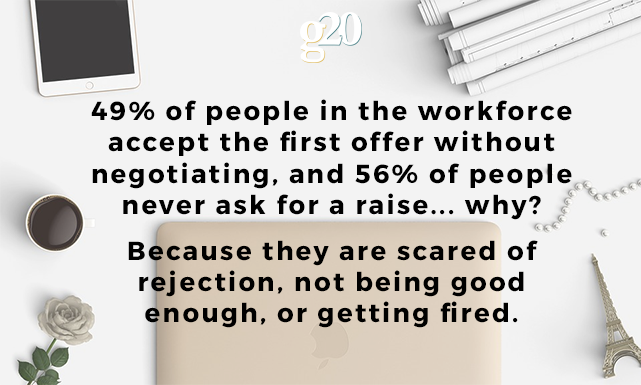This post contains affiliate links.

You’re in your 20s, possibly at your first “real” job. It’s been a few months, and you like where you are, but you just don’t know where to go from here. It seems too early to leave and you want to stick around, but you want more.
This is the narrative that I’ve heard from many twenty-somethings who are new to the “real world.” A lot of millennials or post-grads are used to short-term jobs or internships and just don’t know next steps–do we ask for a promotion? A raise? And how?
It’s important that millennials understand how to climb the latter instead of sit at standstill in their careers, whether they believe it’s their life’s calling or not.
Here are just a few thoughts on millennials and their careers, from career and business coach Rachel Ritlop:
- Millennials are at the most important time in their life right now, with about 80% of life’s most defining moments occurring before the age of 35.
- About half of Gen Y is unemployed or underemployed.
- The bulk of earnings growth occurs during your first decade of work.
“Right now, millennials are really laying the foundation for their adult life, and with each year that goes by they are either raising the ceiling of their potential future net worth, or lowering the ceiling on it,” says Rachel.
Twenty-somethings may face a turning point in their lives soon: if you don’t take control of your own career, it may slip away from you and stick you somewhere you don’t want to be. From managing work and team expectations, to finding the right time to ask for a raise or promotion, to finding the time to create new opportunities, we’ve compiled a list of some tricky career situations and how to tackle them best.
How To… Ask for a Promotion
Some people just feel stuck in their current position, especially if they’ve been there a while. Actively look and seek out new opportunities for promotion at your company–and then make the ask:
1. Find the right time. If your company is going through a time of transition or increased work, consider using the opportunity to show your stuff and prove you’re ready for a promotion. Have a work anniversary or performance review coming up? It might be the right time for you to pop the question.
2. Point out what you’ve learned in the past year and how you’ve grown. It could be helpful to point to specific instances of when you’ve taken the lead on something, and why you think that would make you a good fit for a promotion to the next level. Talk about your long-term goals with the company, not just what you want for the time being.
3. Ask for feedback. If your employer isn’t quite ready to bump your title up, ask what you could be doing better to get there. Believe me–I’m the worst when it comes to criticism. I take everything personally. But feedback and constructive criticism are something we all have to face once and a while, because otherwise we’d be relying on self-criticism (which is usually a little biased) to get better at our jobs. (Bonus: here’s our guide on When (and Why) to Seek Feedback From Your Boss).
How To… Ask for a Raise

“49% of people in the workforce accept the first offer without negotiating, and 56% of people never ask for a raise… why? Because they are scared of rejection, not being good enough, or getting fired,” says Rachel.
Asking for a raise seems like the scariest thing in the world, right behind interviewing and performance reviews. The truth is–all of these things are apart of life and you have to get in these uncomfortable situations if you ever want to advance in your career.
1. Do your research. While its not always possible to know how much your company can afford to increase your salary, it is possible to do your research on how much is acceptable to ask for at that point and time. How much are others in your city making at the same position?
Generally, employees may ask for a raise of 3-5%, but if a promotion ask is also on the table, a 10% pay raise may be suggested.
2. Get in the right mindset. You can’t walk into a meeting with your boss ready to ask for a raise without bringing the right balance of confidence and calmness.
“Once your mindset is in the right place, know you value by researching what other people with similar credentials in similar positions are making,” says Rachel, “Then make sure you are able to prove your value by citing things that have added to your employers bottom line.”
Find a good time that works for everyone (Rachel suggests that your boss may be the calmest and have a clearer head on Tuesdays, mid-morning). Sometimes, starting with a simple, “I was hoping we could talk about my salary” is the best way to approach the situation. After that:
– Bring up examples of projects you’ve taken on and their outcome.
– Bring up how much responsibility you’ve gained since starting–in fact, your boss may not know or realize a lot of the things you do that add value.
– Show your value–use specific examples if you need to (i.e. sales on this client have increased 25% since I took over).
– Point out how long you’ve been at the company and how long it’s been since your last salary raise.
3. Have a plan for rejection. Hey, it happens. Sometimes your boss may think you’re not quite ready, and sometimes there’s just no money in the budget. But either way–your response, both in front of your boss and when you get back to work, needs to be professional.
If you can’t get the raise you wanted, try shooting for something else, like a more flexible work time or more vacation days, Rachel suggests.
If you’re frustrated with how the situation was handled, or really think you deserved a raise, take time to evaluate it all: is it still the right job for you?
How To… Keep the Momentum
A promotion or a raise is not an excuse to take a break. Your work always matters, and your supervisors will notice if you keep up the hard work.
1. Learn from your coworkers. If you have a coworker who specializes in something you’re interested in learning more about, get in touch. Ask to sit down with them for short periods–maybe 30 minutes a week–and just observe and ask questions. Enhancing your skills can bring you to the next level, and flattering your coworkers is another big perk.
2. Learn online. If you can’t find the time to sit down with your coworkers and learn from then, check out online learning. I love staying productive with professional development classes. Sites Udemy, Skillshare and Lynda offer free learning that also doesn’t take too long.
3. Keep the end goal in mind. Unless you’ve been promoted to CEO, this isn’t your last stop. You’ve got a few more steps to take, and the fact that you’re working at a job and just conquered asking for a raise or promotion (whether you earned them or not) is an accomplishment! Work hard and keep dreaming about the day when you can write “got my dream job” all over LinkedIn.
For some, keeping the momentum means leaving their current job and pursing new opportunities.
“At the end of the day, people are more productive when they feel passionate about their work, and if you are trying to force a job or career to work for you, it will only result in bad news; both for you emotionally, physically, and mentally and for your employers bottom line and company morale,” says Rachel.
TRUTH BOMB: If you’re not your best self and feel like you’re in a good role for yourself, you’re not doing your best job for your company–and that’s not fair to anyone!
Your next steps: figure out what career contentment means for you, spend time preparing and go get ‘em.
[clickToTweet tweet=”The Step-By-Step Guide to Asking For a Raise and a Promotion” quote=”The Step-By-Step Guide to Asking For a Raise and a Promotion”]
Many thanks to Rachel Ritlop for her contributions to this article. Rachel is a Career and Business Coach to Gen Y. She empowers millennials to make more money and define their own path to success by landing their dream job or starting their own businesses. Rachel earned her Master’s Degree in Education with a dual focus in Vocational Rehabilitation Counseling and Mental Health Counseling and worked as a counselor prior to beginning her coaching business. Her life’s work today is to help as many millennials build and succeed in their dream careers. Connect with her on Twitter @rachelritlop.
